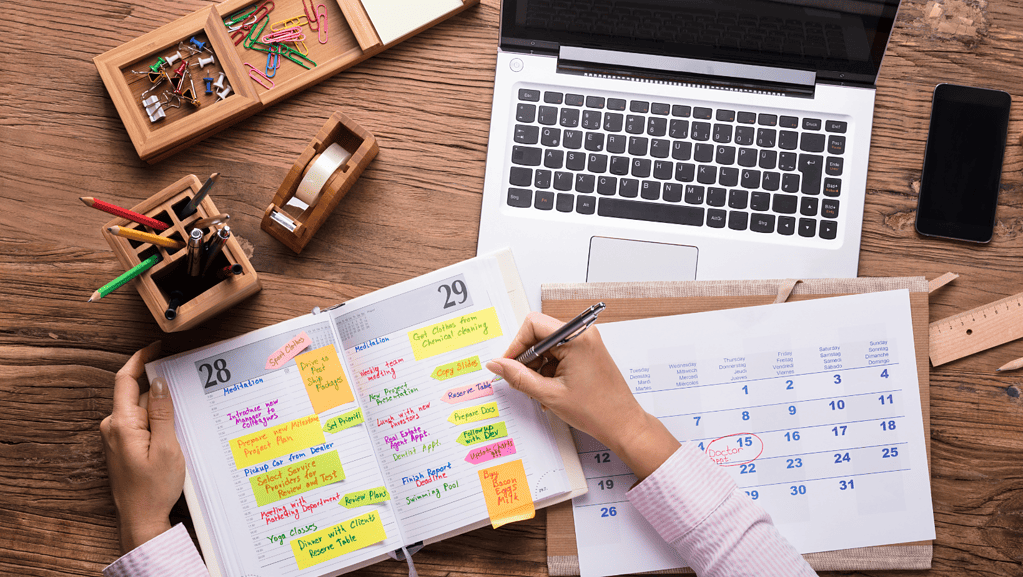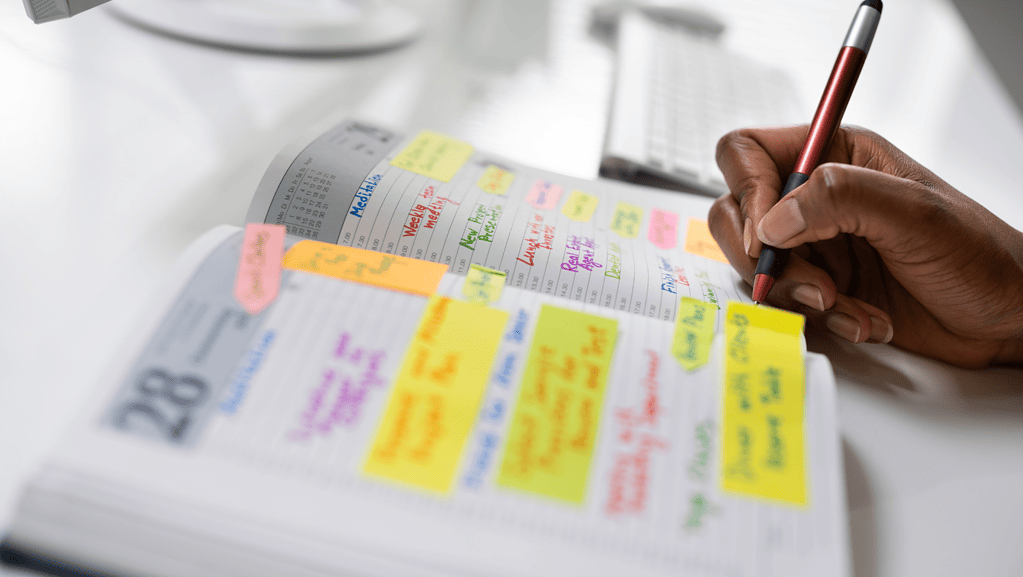
This post may contain affiliate links. For more information, read the full disclosure here.
Ever catch yourself wondering, “Why do I feel the need to plan everything?” If you’re the type who’s always jotting down tasks, setting goals, and leaving nothing to chance, you’re not alone.
It turns out a lot of us have this inner drive to organize our world. It’s pretty fascinating why we do it. For starters, our brains naturally dig a bit of structure—it just feels right to have things in order.
Planning isn’t just about loving order and organization, though. It can also be a sneaky way to keep anxiety at bay. Plus, let’s face it, having a plan gives you a sense of being in the driver’s seat for what’s coming up, especially when life throws curveballs at you.
But here’s something to consider: could too much planning cramp your style? Being super attached to your plans might mean you’re missing out on the fun of just going with the flow.
The trick is to find that happy medium where you can plan enough to feel secure but also leave room for a little impromptu magic. Stick with me, and we’ll explore how to balance your love for planning with the joy of living in the moment. Ready to dive in? Let’s go!
The Psychology Behind Planning

Feeling the need to plan everything can be both a blessing and a curse. While meticulous planning can help you stay organized and accomplish your goals, it can also lead to stress and anxiety if overdone.
To uncover the real reasons behind your need to plan every detail, let’s explore a few possible root causes:
- Perfectionism[1]: This might be driving your need to plan everything. Perfectionists often believe that by planning every little detail, they can avoid mistakes and achieve the perfect outcome. It’s important to recognize that imperfections are a natural part of life, and sometimes, it’s best to let go of the need for control.
- Fear of Uncertainty[2]: You may be trying to plan every aspect of your life to mask your anxiety about the future. Planning might be your way of creating a sense of predictability and control over uncontrollable situations. To help counteract this, try to accept and embrace uncertainty, recognizing that it’s impossible to plan for every possible outcome.
- Previous Experiences: Past setbacks and failures might have left you with the impression that things go wrong when you don’t plan thoroughly. Acknowledge those past experiences and learn from them, but remember that over-planning isn’t always the answer.
- Personality Traits: Your innate personality might also play a role in your need to plan everything. Those who score high in conscientiousness, for example, are more naturally inclined to be organized and detail-oriented. Understand that your tendencies might simply be an inherent part of who you are, but strive to strike a balance between planning and spontaneity.
- Procrastination in Disguise: Consider whether over-planning could be a form of procrastination. Planning can give you the illusion of being productive while not actually accomplishing the tasks at hand. Instead of spending countless hours on planning, try to focus on taking action.
From achieving career goals to maintaining relationships, effective planning helps us navigate life’s challenges and make the best decisions for our future. However, it is essential to find a balance between planning and embracing spontaneity.
It’s also important to recognize whether your overplanning stems from anxiety, fear, or any negativity. If that’s the case, you may want to consider working on this (through a therapist or any other fitting way) to help yourself.
The Role Of Anxiety In Pre-Emptive Planning
Anxiety plays a significant role in the urge to plan everything in advance. It’s a common defense mechanism to cope with the uncertainty and unpredictability of life.
When you excessively plan, you’re attempting to alleviate anxiety by taking charge of potential situations that may arise. Here’s how anxiety influences over-planning:
- Fear of the unknown: One key reason folks excessively plan is dealing with the fear of unpredictable events. By going through different scenarios and preparing for them, you create a sense of control, making it easier to manage your anxiety.
- Perfectionism: Anxiety and perfectionism often go hand in hand. The desire to avoid mistakes or ensure things go smoothly may lead you to plan every single detail, believing it’s the best way to prevent undesirable outcomes.
- Fear of failure: Anxiety can make you hyper-vigilant towards potential threats of failure. Over-planning, in this case, is a way to reduce the chances of failure by thoroughly analyzing and organizing your actions.
- Low self-esteem: If you doubt your competence to deal with unexpected situations, it might contribute to the need to plan pre-emptively. By doing so, you reassure yourself that you can handle any problems that may arise.
It’s important to understand that anxiety is a natural emotional response to uncertain situations. However, when it reaches an unhealthy level, it can impact your daily functioning and overall well-being. Below are some ways to keep your anxiety in check:
- Mindfulness practices: Techniques such as meditation or deep breathing exercises can help you remain present and focused, reducing the desire to over-plan.
- Setting realistic expectations: Acknowledge that no matter how much you plan, the unexpected can still occur. Learn to set achievable goals and adjust your expectations accordingly.
- Accept uncertainty: Embrace the understanding that life is inherently unpredictable and not everything can or should be controlled.
- Seek professional help: If your anxiety continues to affect your daily life, consider speaking with a mental health professional for guidance and support.
Why Do I Feel The Need To Plan Everything: 3 Reasons

Understanding The Role of Childhood Experiences in Planning
When looking for the reasons behind your constant need to plan everything, it’s essential not to overlook the role of childhood experiences in shaping this behavior.
Influence of Authority Figures
- Early Life Encounters: Your interactions with authority figures, such as parents, can significantly impact your need for control and order in your everyday life.
- Parental Influence: Perhaps your parents instilled in you the importance of being organized and well-prepared, which you now carry into adulthood. They might have emphasized household chores, schedules, and punctuality, making planning feel like a norm for you.
- Structured Upbringing: A structured upbringing may have led you to develop a sense of security and stability when you have a plan in place.
Childhood Factors Contributing to Planning Needs
- Unpredictability: Experiences of unpredictability or sudden changes in life circumstances may have left an indelible mark on your sensibilities, causing you to adopt a meticulous approach to life.
- Role Models: Exposure to obsessive planners, such as teachers or coaches, could have influenced your behavior. These figures may have:
- Strongly encouraged goal-setting and planning ahead
- Emphasized the importance of organization
- Fostered a structured learning environment
Genetic Predisposition
- Inherited Traits: The role of genetics in your need for planning should not be discounted. Some individuals are naturally predisposed to these traits, which could be due to:
- Genetics
- Inherited temperament
- Natural aptitudes
It’s important to remember that while understanding the reasons behind your need to plan can provide valuable insight, it’s also crucial not to blame or dwell on the past.
Recognizing the factors contributing to your planning tendencies may help you adapt and improve your strategy, making the planning process even more efficient and enjoyable for you.
The Fear of Losing Control
One of the main reasons you might feel the need to plan everything in your life is the fear of losing control.
The underlying causes for this are often insecurity and uncertainty: The belief that planning gives you control and direction over your future can help alleviate feelings of insecurity and uncertainty.
Contributing Factors To Fear of Losing Control
- Past Experiences: Negative events that happen due to a lack of control might lead your brain to overcompensate by creating meticulous plans.
- Perfectionism: The urge to plan everything might stem from a desire to achieve a flawless life, but it’s important to acknowledge that perfection is unattainable.
- Anxiety: Planning can be a coping mechanism to reduce anxiety about the future by making you feel more prepared.
- Fear of the Unknown: Planning provides a clearer vision of the future, which can reduce the fear associated with uncertainty.
By identifying the root causes of your fear of losing control, you can work on finding a balance between planning and embracing life’s surprises.
The Influence of Perfectionism on Planning
Perfectionism is often the driving force behind the compulsion to plan everything. It’s characterized by striving for flawlessness and setting very high standards for performance. This can lead to a critical self-evaluation and worry about others’ opinions.
Why Perfectionism Leads to Over-Planning
- Sense of Control: Detailed planning can make you feel in control, aiming to minimize errors and setbacks.
- Avoiding Criticism: With a fear of failure, planning becomes a defense mechanism against potential judgment from others.
- Reducing Anxiety: Planning can be a grounding act, providing solace through a clear roadmap for the future.
By understanding how perfectionism influences your planning habits, you can find a balance that allows for both structure and flexibility. This balance is key to maintaining productivity while also safeguarding your mental well-being and staying open to life’s unpredictabilities.
Finding Balance: The 8 Benefits of Flexibility
Embracing flexibility is like having a superpower that helps you deal with life’s surprises without getting too stressed. It’s about being able to change your plans when something unexpected comes up, which actually makes you stronger.
Being flexible means handling problems in different ways, and sometimes, you might even come up with better solutions. It gives you the chance to try new things and be creative. Plus, it helps you find a good balance between work and fun.
When you’re flexible, you don’t get stuck in one way or another, and that can make you feel more relaxed and happy in the long run. Here is the full list of benefits:
- Adaptability: Easily adjust to new situations and challenges.
- Resilience: Bounce back quickly from setbacks.
- Open-mindedness: Consider different perspectives and ideas.
- Problem-solving: Find creative solutions to problems.
- Creativity: Freedom to explore new ideas and activities.
- Work-life balance: Manage personal and professional commitments more smoothly.
- Stress reduction: Lower levels of stress when plans change.
- Overall well-being: Feel more relaxed and happier with a flexible approach to life.

How To Stop Overplanning
To curb the habit of overplanning, start by setting clear and achievable goals for each day rather than an exhaustive list of tasks. Give yourself permission to tackle the most critical items first and be flexible with the rest.
Try using the “two-minute rule,” where if something takes less than two minutes to complete, do it immediately rather than scheduling it for later.
Another helpful trick is to set time limits for your planning sessions—use a timer to ensure you don’t spend too long on planning itself. Remember to build in free time or “buffer zones” in your schedule to accommodate any unexpected tasks or opportunities that arise.
Next up is developing a flexible mindset. Cultivate a flexible mindset, allowing room for changes and adapting your plan when necessary. This approach will help you become more open to spontaneous occurrences and opportunities. Two tips:
- Look for alternative solutions and options when facing obstacles
- Be compassionate with yourself when your plans don’t go as expected
Lastly, practice mindfulness to stay present and reduce the urge to overthink future plans. By being mindful, you can appreciate the here and now and reduce the need to control every aspect of the future.
If these tips don’t work and you still struggle to break free from your planning obsession, consider seeking professional help. A therapist or counselor can assist you in identifying and working through the root causes of your obsessive need to plan.
Conclusion: Embracing Life’s Uncertainties
It’s natural to feel the need to plan everything, but embracing life’s uncertainties can lead to personal growth and enriching experiences. In this final section, you’ll explore some strategies to help you let go of excessive planning and embrace life’s uncertainties.
- Practice mindfulness: Becoming more present in the moment helps you let go of the need to control. You’ll become better equipped to adapt to change by focusing on your thoughts and emotions.
- Develop your coping skills: Strengthening your ability to cope with unexpected events reduces the anxiety surrounding them. Consider practicing relaxation techniques, such as meditation, deep breathing, or progressive muscle relaxation.
- Set realistic expectations: Accepting that not everything can be predicted or controlled will make it easier for you to deal with life’s uncertainties. Learn to distinguish between necessary planning and over-planning.
- Cultivate gratitude: Focusing on what you’re grateful for can help shift your attention away from any worries about the future. Create a regular gratitude practice to maintain a positive mindset in the face of uncertainty.
- Take small risks: Start challenging your need for certainty by stepping out of your comfort zone. Experiment with new activities or experiences, make decisions without exhaustive research, or simply go with the flow more often.
By incorporating these strategies into your daily life, you’ll foster a mindset that embraces life’s uncertainties and is more resilient in the face of change.
Ultimately, you’ll find a better balance between planning and letting go, allowing you to experience life more fully and authentically.
